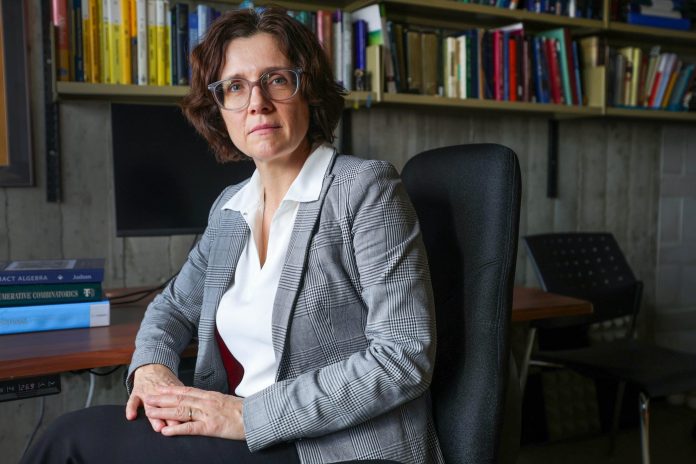
Maggie Macintosh, Local Journalism Initiative Reporter, Winnipeg Free Press
A Winnipeg mathematician is calling on provincial governments to consider banning cellphones in schools to improve numeracy skills and international test scores.
New results from the Organization for Economic Co-operation and Development’s global assessment of 15-year-olds, released one month ago, reveal Canada’s overall mathematics marks have been on a steady decline since 2003.
While the national average was in the Top 10 (81 countries participated in the latest Program for International Student Assessment), it dropped 35 points from 2003 to 2022. Manitoba’s average dropped 58 points during that period.
The downward trend prompted Anna Stokke, a professor of mathematics and statistics at the University of Winnipeg, to pen an open letter to education ministers across Canada.
Stokke said there have been two noteworthy developments over the last two decades — the rise of “new math,” also known as “reform math,” and cellphones.
“If you’re going to learn math, you have to be able to focus on math and anything that’s going to take away from that is going to disrupt your learning,” said the outspoken proponent of foundational skills.
“Practise in math is extremely important and you have to do a lot of practise; you can’t get around it.”
In a recent memo to Education Minister Nello Altomare and his counterparts who oversee kindergarten-to-Grade 12 instruction in their respective jurisdictions, Stokke issued four recommendations.
She wants Manitoba Education and its counterparts to align themselves with “the science of learning” and as a result, update curricula in line with cognitive research and stop funding professional development sessions that are not backed by robust evidence.
“Because of an overemphasis on multiple strategies (for problem-solving) in the classroom, manipulatives and not a lot of practise in math, a lot of kids are getting really behind early on and they can’t get caught up,” she said.
As far as she is concerned, governments also need to increase reporting on student achievement in numeracy and issue a sweeping smartphone ban in K-12 classrooms to reverse the PISA trend.
PISA is administered every three years and its focus rotates between math, reading and science. Grade 10 students were asked additional questions about COVID-19 disruptions, well-being and school life in 2022.
Forty-three per cent of Canadian respondents said they get distracted when using digital devices at school and 33 per cent disclosed their peers’ related activity is a distraction from lessons. The OECD averages were 30 and 25 per cent, respectively.
The majority of teachers in Manitoba use their professional judgment to make rules on cellphone usage.
Citing concerns about bullying and a patchwork of policies that make it difficult to police appropriate use, the francophone school division announced it was introducing a sweeping ban at the start of the 2023-24 academic year.
Elementary students are asked not to take their personal devices to school in the Division scolaire franco-manitobaine. In Grades 9 to 12, teenagers are only supposed to use phones and earbuds during lunchtime.
“I’m also concerned about the impact of personal devices. These are smartphones. It’s more than just being able to text; there’s a lot of things that distract kids, and I think they need to be focused in class,” Altomare said during a phone interview Thursday.
The education minister, who is a retired teacher and principal, said he looks forward to having more dialogue with stakeholders on the subject.
Altomare added he will be curious to meet with DSFM leaders to discuss their policy and related findings when the school year wraps up in June.

